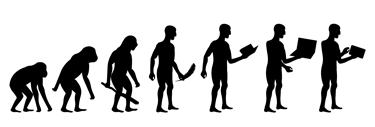Adapt-amnesia, and why it matters
We’re the most adaptable species on the planet, but then we forget that we adapted. That’s bad news for incumbent businesses today.
_______________________________________________________________________________________
By Brad Berens
If you ask evolutionary biologists how long it has been since homo sapiens (humans, y’know, us) last evolved, then you’ll get a range of answers with the closest 10,000 years and the farthest out 200,000 years.
 That’s a long time with neither a software upgrade nor a hardware upgrade.
That’s a long time with neither a software upgrade nor a hardware upgrade.
What this means: if the Wayback Machine were to whisk a baby girl — let’s call her Lily — from the year 7,983 B.C.E. to a present-day hospital immediately after birth, she’d be smaller than the average baby (because Mom wouldn’t have had present-day nutrition or junk food during pregnancy), but otherwise she’d be just fine. Lily’s pre-historic brain and body would have no difficulties learning twenty-first century technology, not to mention earlier skills like reading and writing, arithmetic or science.
Growing up, while Lily might need a stepstool to reach the top shelf in the kitchen, she’d have no trouble using a smart phone, learning to drive, heating up leftovers in a microwave, or ordering a skinny grande vanilla latte at her local Starbucks.
Compare this to a first-generation iPhone from 2007, just 10 years ago. That iPhone couldn’t load any of the apps currently available for download, would run out of memory after taking just a handful of crappy resolution pictures, and would anxiously vibrate to pieces if it tried to load iOS 11.
10 years versus 10,000.
We humans are the most adaptable species on the planet. While it’s true that some forms of A.I. can do things faster than humans, no other biological or technological entity can do as many things as easily as humans can. More importantly, humans are the only creatures that can adapt within an individual lifespan. (Other species only adapt over the course of generations via natural selection.)
We’re adaptable, but we forget that we’ve adapted. We suffer from adapt-amnesia…until we slam into the fact of our previous adaptation. It’s like walking into a glass door that you didn’t see.
A few examples of what I mean:
If you’re lucky enough to drive a car manufactured recently, then you probably open the door using a small electronic device — a clicker, a fob — rather than an old-fashioned key; it takes no time to get used to keyless entry and push-button start. Then, later, when you plop down behind the steering wheel of Grandma’s older sedan, you’ll sit there looking for the “start” button on the dashboard, only realizing after a few painful seconds that you have to pull the key out of your pocket, insert it and turn clockwise to turn the engine over. This feels like a big drag.
For the 40-plus crowd, if you suddenly need to use a typewriter rather than a word processor, then it feels like you’re chiseling letters into a stone wall. Heaven save you if you make a typo because Liquid Paper isn’t on every desk these days.
Let’s say you use Spotify and want to listen to a new song, but it’s not available on the service– it’s galling. “I have to start up iTunes and buy the thing?” Even worse, imagine if a song weren’t digitally available at all and you had to go buy a CD, bring it home from the store, unwrap it, bend down, press the open button on the CD player, insert the disk, and then wait for the disk to load. That’s an agonizing delay, even though just a few short years ago the speed and quality of CDs compared to cassettes and vinyl were astounding.
There’s a deeper level with the Spotify example: you’re likely just to give up and listen to something else rather than use iTunes or buy a CD.
We’ve adapted to the digital world so quickly and so completely that we tend to forget the analog world is even there. At my house, for example, all of our cookbooks gather dust in the garage because we don’t need them: we have iPads.
For all the digital plenitude of information available online, there are still plenty of books, pictures, songs and videos that aren’t a few clicks away. That means they won’t show up on a Google or Amazon or eBay search, and this means that in a profound and disturbing way they don’t even exist. This is one of the reasons the Center researches non-users and lapsed users of the internet: if we only look at users then we’ve taken a narrower view of behavior and attitudes than we should.
Why adapt-amnesia matters
Once you understand that people will effortlessly adapt to new technologies that allow them to accomplish tasks faster, easier and/or cheaper, and that they’ll then forget that they ever did things a different way (unless startled into remembering), then two important implications become clear:
First, there will be no future loyalty to the ways that we do things today: there will merely be inertia and fear of the unknown. The fastest way to overcome that inertia and fear is to smuggle new functionality into a device that the user already has.
Today, that device is the smartphone: “Dad, just text me.” “What’s a ‘text’?” “Oh, here, let me show you.” Tomorrow, that device might be smartglasses or a digital assistant like Siri or Alexa. “I need toothpaste.” “Mom, just ask Alexa.” “She can do that?”
Any business that thinks that customers have affection for the container their product comes in (newspapers, CDs, physical books, a grocery store you have to drive to in order to get eggs) is delusional.
Second, single-use objects (cookbooks, flashlights, cameras) might help us do things better than Swiss-Army Knife tools like smartphones and tablets, but the “good enough” quality of the multi-use devices will usually win because the vast majority of the decisions we make on an hour-to-hour basis just aren’t important enough for us to go find the superior but not-already-in-our-pockets smartphone.
This is the distinction that Herbert Simon, the twentieth century polymath, made between what he called “satisficing” and “optimizing.” Most businesses mistakenly think that their customers are loyal optimizers rather than convenience-seeking satisficers.
_________________________________________________________________________________________________
We’re adaptable, but we forget that we’ve adapted. We suffer from adapt-amnesia…until we slam into the fact of our previous adaptation. It’s like walking into a glass door that you didn’t see.
_________________________________________________________________________________________________
For example, as we’ve seen in the Center’s Future of Transportation project, car buyers today are optimizers because a car is big purchase that you have to live with for years. But all it takes is a brief exposure to the convenience of services like Uber and Lyft for that experience to have a transformative impact on how people think about car ownership.
When we asked a representative sample of Americans if they would consider giving up their own car in favor of services like Uber and Lyft and Car2Go and Zipcar, only 20% would even think of it. However, for the 2% of Americans who take Uber regularly and the 14% who take it sometimes, consideration for giving up owning your own car doubled to 40%. Hailing a ride to get downtown is an exercise in satisficing because it’s just one ride, so there are no long-term stakes.
With adapt-amnesia, in a few short years many Americans won’t just give up owning their own cars, they might forget that they ever had a car in the first place.
__________

Brad Berens is the Center’s Chief Strategy Officer.
See all columns from the Center.
November 30, 2017

